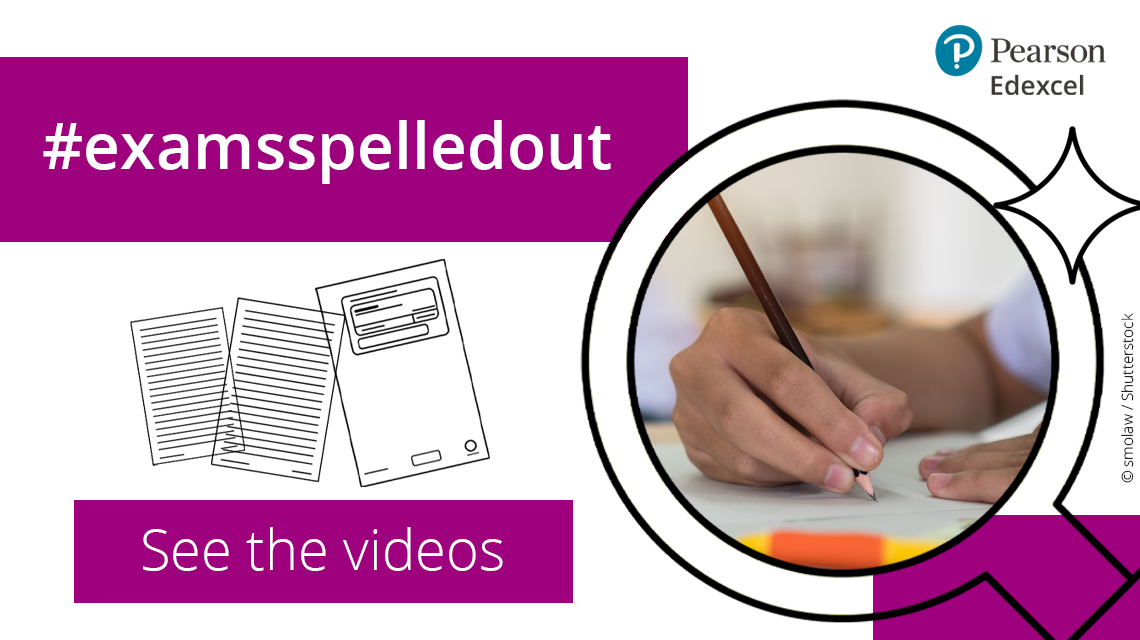Meet our team of Subject Advisors. Experts in their fields, they're here to support you throughout the year and help with all your subject-specific queries. Find out more about the support they provide and sign up to receive regular newsletters and updates.
General qualifications assessment support

On this page we’ll provide updates and information from Ofqual, the Department for Education (DfE), the Joint Council for Qualifications (JCQ) and Pearson, relating to the exams and assessments for our GCSE, AS and A level qualifications.
From announcements and news to support materials and updates, we’ll make sure you have all the information and tools you need to teach our qualifications, help your students with their assessments and post-results support, to enable them to progress.
Spring 2026
Welcome to the spring term. We're here to support you and your students throughout this academic year and we'll keep updating this page to ensure you've got all the latest information you need, including Subject Advisor support, professional development courses and how to get in touch with us.
Ofqual has launched a consultation on proposals for how on-screen assessment should be regulated in GCSEs, AS and A levels in England. Whilst they propose a controlled introduction of on-screen assessment, pen-and-paper will remain central to most exams.
As teachers working directly with students, you understand their needs and the challenges this proposal may present.
Your opinion counts. The consultation closes on 5 March 2026.
Visit our Professional Development Academy where you'll find plenty of courses across subjects, throughout the year, to support teachers and educators in their continuous professional development.
Whether you're new to Pearson Edexcel, looking for ways to improve your students skills, or want to gain insights from recent exam series, you'll find many courses to help you with your teaching and learning.
You can take a look at our guide that provides information on the types of training available, the format of the training, how to access it and the types of subject-specific training we have on offer.
Download the Guide to Professional Development Training
Alternatively you can go straight to the Professional Development Academy and browse the content.
The Department for Education has confirmed that students will not need to memorise formulae and equations for GCSE maths, physics and combined science for summer 2025, 2026 and 2027. This includes the GCSE maths November resit in each of those years.
Ofqual has confirmed that students taking GCSE maths, physics and combined science exams will be provided with updated formulae and equation sheets for each exam series.
We will follow the same approach for our International GCSE Physics, Science Double Award and Single Award (physics papers) for all series. Clean copies will be provided with the exam papers.
Links to the 2025 formulae and equation sheets can be found below.
- GCSE Maths Foundation tier formuale sheet
- GCSE Maths Higher tier formulae sheet
- GCSE Physics and Combined Science equations sheet
- International GCSE Physics and International GCSE Science (Double Award) equation sheet
- International GCSE Science (Single Award) Physics equation sheet
Ofqual has also published:
A letter to schools and colleges about grading arrangements for 2025, the provision of support materials in the form of formulae and equation sheets, predicted grades, resilience arrangements and cyber security. Read the letter to schools and colleges - October 2024
A letter to higher education admissions officers on grading arrangements for 2025. Read the letter to higher education admissions officers 2024
A letter to governors and trustees about qualification results from 2024. Read the letter to governors and trustees: qualification results 2024
A press release reminding schools and colleges of the importance of cyber security. Read Ofqual poll highlights value of cyber security training in schools
The Joint Council for Qualifications has published their key dates and timetables for 2026.
One date has been set aside as contingency in the event of national or significant local disruption to exams in the UK:
- 24 June – full day
Download the JCQ Key dates in the examination cycle guide June 2026 exam series
Take a look at the key dates and timetables for all exam series in 2026
Please see the updated JCQ guidance on AI use in assessments and On 30 April 2025 the Joint Council for Qualifications (JCQ) published their updated JCQ guidance on AI Use in Assessments.
The guidance is designed to help students and teachers to complete NEAs, coursework and other internal assessments successfully, giving students the chance to demonstrate skills which cannot be assessed in exams.
Please do share the latest version of the guidance with senior leaders, teachers and assessors in your school or college. It’s vital the guidance informs school policies on AI use, and schools and colleges provide staff and students with clear information.
A summary of the key updates is available on the JCQ website
They also have a number of support documents for conducting coursework and non-examonation assessments for teachers and candidates.
JCQ have produced guidance for centres on cyber security in order to safeguard sensitive information, including personal student data, and to protect the integrity of secure assessments.
In today's digital landscape, it is crucial to adhere to industry best practices to mitigate the risk of cyber threats. Please read the information provided by JCQ that includes key guidelines that align with industry standards and will help protect your digital assets.
Ofqual Guidance on collecting evidence of student performance to ensure resilience in the qualifications system for GCSE, AS and A levels, Project Qualifications and AEA. This guidance also applies to our Edexcel Level 3 Mathematics in Context (Core Maths) and Edexcel Awards in Mathematics.
Summary for Pearson Centres
In March 2025, Ofqual updated the resilience guidance for centres delivering: GCSE, AS and A levels, Project Qualifications and Advanced Extension Award in maths (AEA). This guidance also applies to our Edexcel Level 3 Mathematics in Context (Core Maths) and Edexcel Awards in Mathematics. We will provide specific guidance on resilience arrangements for other qualifications, including Technical Qualifications in T Levels, where necessary.
The guidance lays down the arrangements that schools and colleges are asked to make to provide resilience in the exam system, in the unlikely event that the government determines that exams are not able to go ahead in future.
Centres should read the guidance in full to ensure they understand the details of the arrangements.
The guidance asks that schools and colleges:
- ensure students sit mock exams in exam conditions and that these are retained, either digitally or physically
- aim to complete assessments in the first half of the academic year where possible
- plan assessment opportunities to gather evidence of student performance in line with their usual assessment approaches
- provide assessment content, similar to that which students would expect in their summer exams, and across the assessment objectives for the qualification
- plan for total assessment time that does not normally exceed the total time students would spend taking exams/non-exam assessment for the relevant qualification
- provide assessments that are similar to full or parts of the exam papers students are preparing to take next summer, based on exam board materials as far as possible
- continue to allow private candidates to register with them in the usual way
- apply the same reasonable adjustments for disabled students as would be made for summer assessments, retaining records of the adjustments and the reasons for them
- record any special consideration issues (such as illness or family bereavement) so that these can be taken into account when determining a grade, if necessary
- make it clear to students that it is expected that exams and formal assessments will go ahead as planned
- make it clear to students that any assessment evidence collected and retained will be used to determine grades only in the unlikely situation that exams and formal assessment could not go ahead
- make it clear to students, before they take any assessment, whether their performance in the assessment would be used as part of evidence to determine a grade for them if exams cannot go ahead as planned
- ensure that students are assessed under exam-like conditions wherever possible i.e. supervised, working independently, under timed conditions etc.
The guidance asks that teachers:
- mark the assessments in line with published exam board mark schemes and guidance where appropriate
- not use grade boundaries from autumn 2020 and 2021 and summer 2022 when they are providing an indicative grade for students
- provide students with feedback, which could include marks or comments
- make it clear to students that any grade used to indicate the level at which the student has performed is not an indication of what their final grade would be if it became necessary to award a qualification using the evidence
- make it clear that it is not possible to determine a final qualification grade unless Ofqual sets specific guidance on this, which Ofqual will do only if exams do not go ahead
- support their students to complete non-exam assessment (NEA), in line with the timescales set by exam boards
- record the reason for any late identification of reasonable adjustments and where possible allow the student to take a different, but equivalent, assessment with the reasonable adjustment in place.
Teachers may tell the student the grade at which their performance in the assessment indicates they have performed.
The Joint Council for Qualifications (JCQ) has updated it's Instructions for Conducting Examinations (ICE).
You can also visit the JCQ website for all the support and guidance you need for conducting exams in your centre. There is plenty of guidance for you to pass on to all staff who need to know this important information, including videos, and downloadable PDFs.
Year round support
We'll be updating this page regularly and provide news and information in our monthly Pearson qualifications bulletin. For subject-specific support, please do stay in touch with your Subject Advisors or you can also contact us directly if you have any other queries.



